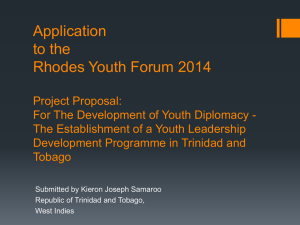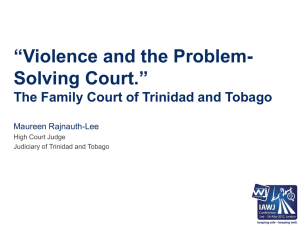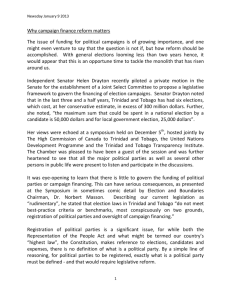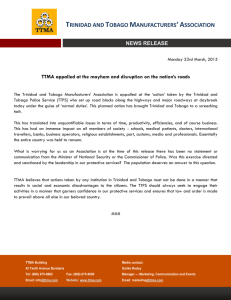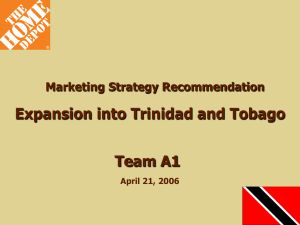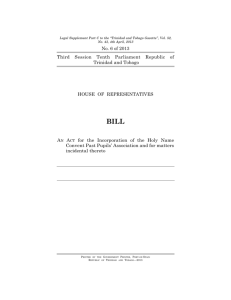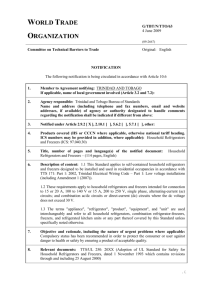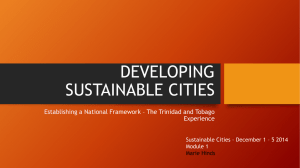OEA/Ser
advertisement
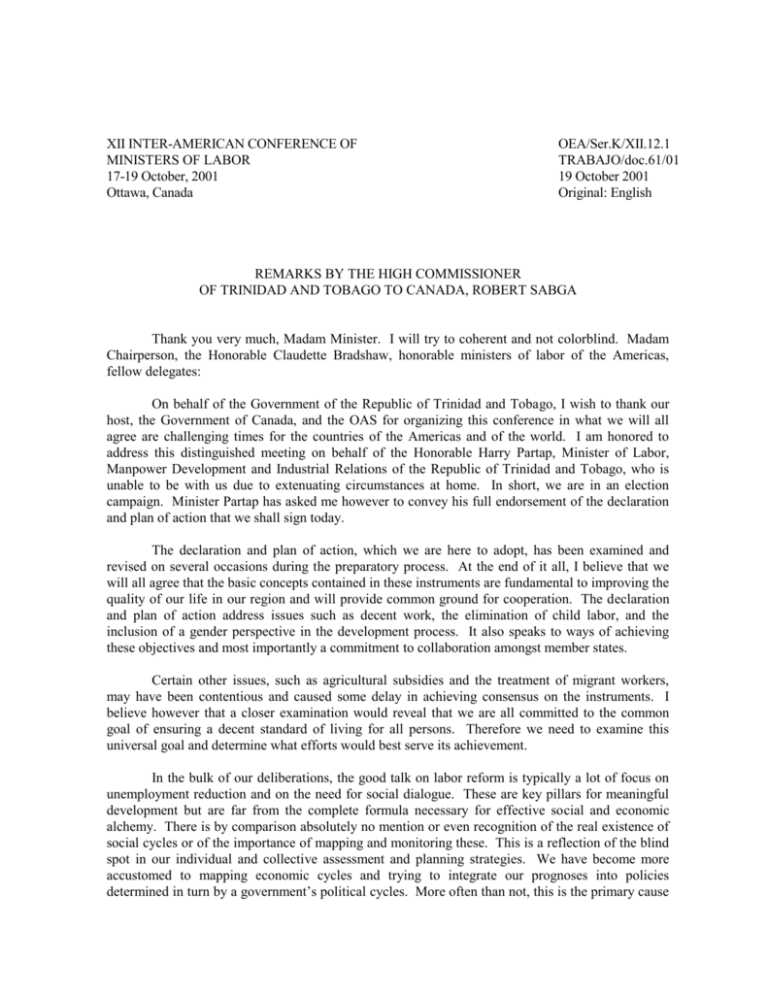
XII INTER-AMERICAN CONFERENCE OF MINISTERS OF LABOR 17-19 October, 2001 Ottawa, Canada OEA/Ser.K/XII.12.1 TRABAJO/doc.61/01 19 October 2001 Original: English REMARKS BY THE HIGH COMMISSIONER OF TRINIDAD AND TOBAGO TO CANADA, ROBERT SABGA Thank you very much, Madam Minister. I will try to coherent and not colorblind. Madam Chairperson, the Honorable Claudette Bradshaw, honorable ministers of labor of the Americas, fellow delegates: On behalf of the Government of the Republic of Trinidad and Tobago, I wish to thank our host, the Government of Canada, and the OAS for organizing this conference in what we will all agree are challenging times for the countries of the Americas and of the world. I am honored to address this distinguished meeting on behalf of the Honorable Harry Partap, Minister of Labor, Manpower Development and Industrial Relations of the Republic of Trinidad and Tobago, who is unable to be with us due to extenuating circumstances at home. In short, we are in an election campaign. Minister Partap has asked me however to convey his full endorsement of the declaration and plan of action that we shall sign today. The declaration and plan of action, which we are here to adopt, has been examined and revised on several occasions during the preparatory process. At the end of it all, I believe that we will all agree that the basic concepts contained in these instruments are fundamental to improving the quality of our life in our region and will provide common ground for cooperation. The declaration and plan of action address issues such as decent work, the elimination of child labor, and the inclusion of a gender perspective in the development process. It also speaks to ways of achieving these objectives and most importantly a commitment to collaboration amongst member states. Certain other issues, such as agricultural subsidies and the treatment of migrant workers, may have been contentious and caused some delay in achieving consensus on the instruments. I believe however that a closer examination would reveal that we are all committed to the common goal of ensuring a decent standard of living for all persons. Therefore we need to examine this universal goal and determine what efforts would best serve its achievement. In the bulk of our deliberations, the good talk on labor reform is typically a lot of focus on unemployment reduction and on the need for social dialogue. These are key pillars for meaningful development but are far from the complete formula necessary for effective social and economic alchemy. There is by comparison absolutely no mention or even recognition of the real existence of social cycles or of the importance of mapping and monitoring these. This is a reflection of the blind spot in our individual and collective assessment and planning strategies. We have become more accustomed to mapping economic cycles and trying to integrate our prognoses into policies determined in turn by a government’s political cycles. More often than not, this is the primary cause -2- of the inability of many trade and labor strategies to effect meaningful change, which in turn can lead to inefficient, ineffective, and often meaningless future trend analyses for social policy planning. In Trinidad and Tobago, emphasis on achieving the goal of a decent standard of living for all persons has been placed on empowerment. For the Ministry of Labor, that translates into empowerment of workers. The initiatives which have been undertaken by the Government of Trinidad and Tobago in this regard have included legislation, sensitization, and information provision. The legislative focus of the Ministry of Labor in Trinidad and Tobago has been the empowerment of individual workers. New legislation in the areas of minimum wage and maternity protection has sought to place power in the hands of the individual worker to protect his or her right. We are also committed to the sensitization of the workers on their rights and responsibilities. This is deemed to be crucial at this time when workers are now being forced to deal with issues such as HIV/AIDS, changing technology, and the global movement of labor. The Government of Trinidad and Tobago recognizes that information is the key to empowerment and has established a labor market information system. This system is the key tool in development as it provides information to job seekers and job providers alike in a macro sense, as well as providing a strategic information source to guide policymakers. The aim is ultimately to enhance the situation of labor market players. My government sees the labor market information system as essential to this process of information sharing and as the system continues to be developed we earnestly hope that the process of information sharing would involve also amongst our member countries. Honorable ministers, you will recall that in the final Declaration of the Third Summit of the Americas held last May in Quebec City, our heads of state and government collectively registered their condemnation of attacks on civilian populations. They further recognized the need to improve the conditions of human security in the Hemisphere. The issue of human security is central to the work of this distinguished forum of labor ministers and social partners and as such we must pay close attention to the effects of the attacks of September 11 on the people and workers of our region. As you know, many of the economies of the Caribbean are nearly or wholly dependent on tourism for funding. When they are now experiencing, in what would ordinarily be a season of plenty, a 40% to 80% cancellation rate for hotel bookings, one can easily understand the economic impact and fallout on commercial activity and on employment in those countries. If this trend is prolonged, the Caribbean may well become an economic disaster area. Despite the tremendous advances and the enjoining, albeit somewhat grudgingly, of the move towards hemispheric free trade, the effect on the region following the tragic events of September 11– not just on tourism, but also on the offshore financial services, which are the backbones of many of the economies of the Caribbean–has left few of us in any doubt that the globalization thrust has come to a sudden halt. In whispered tones some now talk about the real possibility of returning to the kind of protectionism mechanisms that obtained a decade ago as a means of trying to buffer or defend our more fragile economies from the economic implications of a looming global recession. -3- In this context, I wish to extend the unreserved support of the Government of Trinidad and Tobago for the Draft Statement on Terrorism as proposed by the Government of the United States of America, which was drawn up in response to the events of September 11 of this year. The Government of Trinidad takes this opportunity to reiterate its condemnation of these dastardly acts and its commitment to the global cause of the eradication of terrorism. In closing, Madam Chairperson, distinguished ministers of labor, and fellow delegates, I will once again, on behalf of the Honorable Minister of Labor, Manpower Development, and Industrial Relations of the Government of the Republic of Trinidad and Tobago, wish to endorse this meeting’s declaration and plan of action and the principles contained therein, and to express the hope that all our countries will benefit fully from the development follow-up that will result from this process. As we continue our deliberations, I wish us both focus and vision and the ability not just to see but also to look beyond the challenges that we confront. Thank you for listening. TB01208E02
